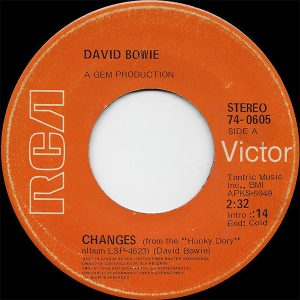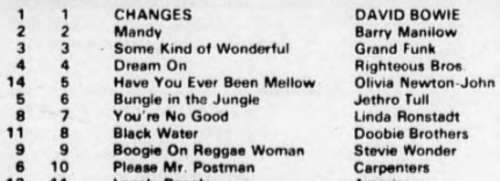#3: Changes by David Bowie
City: Winnipeg, MB
Radio Station: CFRW
Peak Month: February-March 1975
Peak Position in Winnipeg ~ #1
Peak position in Vancouver ~ #33
Peak Position on Billboard Hot 100 ~ #41
Peak Position on Sweden Singles chart ~ #4
YouTube: “Changes”
Lyrics: “Changes”
David Robert Jones was born in 1947 in Brixton, a suburb in the southern part of London, UK. From an early age he demonstrated talent as a singer and especially through dance and movement. When he was nine years old his father brought home some 45’s by Elvis Presley, Frankie Lymon & The Teenagers, Fats Domino and others. When David Jones heard Little Richard sing “Tutti Frutti” he later said in an interview that he “heard God.” Growing up, David learned to play the recorder, ukulele, piano and baritone saxophone. In 1962, at the age of 15 he formed a band named the Konrads. In 1964 he formed a band named David Jones and the King Bees. They appeared on the variety show Ready Steady Go! to sing their debut single, “Liza Jane”. Jones briefly moved on to join the Mannish Boys before being the front man for Davy Jones and The Lower Third. They released a single in 1965 titled “You’ve Got A Habit Of Leaving”. Due to the growing popularity of another English recording artist named Davy Jones (who went on to become lead singer for The Monkees), David Robert Jones decided to change his professional name to David Bowie. He chose his surname after a 19th Century American pioneer named James Bowie who invented the Bowie knife.
In 1966 the first single released credited to David Bowie was with his backing band, The Buzz. However, Bowie continued to be met with a string of commercial failures with each single release and his debut album in 1967. He enrolled in the London Dance Center in the fall of 1967. Bowie added mime to his repertoire and was an opening mime act for a tour with Tyrannosaurus Rex in 1968. David Bowie also appeared in a TV commercial for Lyons Maid ice cream. But it was in 1969 with the release of “Space Oddity”, that David Bowie had his first commercial success as a recording star. The single climbed to #5 on the UK singles chart. It was a commercial failure in North America until it was re-issued in 1973 and became a Top 20 hit nationally in the USA and Canada, and peaking at #4 in Vancouver.
In 1972 Bowie launched a ground-breaking tour billed as the Ziggy Stardust Tour with the Spiders from Mars. The tour promoted his album The Rise and Fall of Ziggy Stardust and the Spiders from Mars and Aladdin Sane. Between January 1972 and June 1973, David Bowie and his band performed at 191 concerts across the UK, North America and Japan. During this time Bowie had a number of Top Ten hits in the UK including “Starman”, “Suffragette City”, “The Jean Genie”, “Drive-in Saturday Night”, “Life On Mars”, “Laughing Gnome”, “Sorrow”, “Rebel Rebel” and “Knock On Wood”. While some of these had local radio market chart success in Canada ~ for example, “Rebel Rebel” climbed to #8 in Ottawa. But most were only known as tracks from albums played on FM stations in Canada (and the USA).
One of the singles in the early 70s was “Changes” from the Hunky Dory album. In 1972 the song stalled at #66 on the Billboard Hot 100. In 1975, CFRW added the song to their playlist and it became a chart-topping hit.

The lyrics of “Changes” focus on the compulsive nature of artistic reinvention and distancing oneself from the rock mainstream. The author James E. Perone calls Bowie’s lyrics “thought-provoking,” and “clearly autobiographical.” At this point in his career, Bowie was frequently being told how to musically progress by his managers and labels, leading him to experiment with genres such as folk, hard rock and soul. This is reflected in the first verse, in which the narrator looks at himself through a mirror to help find his true identity. Perone argues that the verse serves as a “public acknowledgment” that these earlier styles, all of which failed to earn him stardom, were not the “true David Bowie style.” The biographer Nicholas Pegg identifies the line “I turned myself to face me” as mirroring Bowie’s encounter with himself in his 1970 track “The Width of a Circle”. O’Leary writes that with “Changes”, Bowie commits to a “life of constant revision.” By saying “look out you rock ‘n’ rollers”, Bowie is “throwing the gauntlet down to existing rockers” and “putting a distance between himself and the rock fraternity.”
“Changes” peaked at #1 in Pittsburgh, and Winnipeg (MB), #2 in Minneapolis/St. Paul, #3 in Rapid City (SD), #4 in Fort Lauderdale and Rochester (NY), #5 in Boston, #7 in Ottawa, Harrisburg (PA), Buffalo, Columbus (OH), and Akron (OH), #8 in Olympia (WA), Sioux Falls (SD), Boise (ID), and #10 in Grand Forks (ND).
In 1975, David Bowie’s Young Americans album produced a minor hit with the title track and a number one hit in the USA with “Fame”. He made the Top Ten again that year with “Golden Years” as his debut single release from Station to Station.
After his chart-breaking year in the USA in 1975, Bowie again struggled to attain chart success across the Atlantic. In the UK he had several Top Ten singles in the late ’70’s: “Sound And Vision” in 1977 and “Boys Keep Swinging” in 1979. But these best chart runs in the UK did no better than #69 on the Billboard Hot 100. And Low, Heroes and Lodger each failed to crack the Top Ten on the Billboard album chart.
In 1980 “Ashes To Ashes” became his second #1 single in the UK. In 1981 Bowie had a #1 single in the UK, featuring Queen titled “Under Pressure”. The following year Bowie had a #1 hit in Sweden and Norway with “Cat People (Putting Out Fire)”. But it was his 1983 album release of Let’s Dance which sent him to the top of the album and singles charts. His singles from the album were the title track “Let’s Dance”, “China Girl” and “Modern Love”.
During the rest of the ’80’s, David Bowie had three notable international hits: “Blue Jean”, “Dancing In The Street” with Mick Jagger, and “Absolute Beginners”. In 1997 Bowie was a featured artist in the #1 hit “Perfect Day”, for the UK fundraising single for Children In Need.
Bowie made the Top Ten internationally for the last time in 2013 with “Where Are We Now?”, breaking into the Top Ten in 13 countries.
In 2016 David Bowie died on January 8. He was 69 years old. His twenty-fifth and final studio album, Blackstar, was released to critical acclaim. The album climbed to #1 in 23 countries.
August 29, 2025
Ray McGinnis
References:
Paul Gallagher, “David Bowie died from liver cancer he kept secret from all but handful of people, friend says,” The Independent, January 11, 2016.
“About David Bowie,” David Bowie.com.
Nicholas Pegg, The Complete David Bowie, (Titan, 2011) 30.
Sophie Heawood, “David Bowie has Gone from New to Old – and What a Beautiful thing it Is,” Independent, January 8, 2013.
Mick Brown, “David Bowie interview from 1996: ‘I Have Done Just about Everything that it’s Possible to Do’,” Telegraph, January 10, 2017.
“Rolling Back: David Bowie’s infamous 1976 interview with Cameron Crowe,” Rolling Stone, Steve Pafford.com, January 2018.

CFRW 1470-AM Winnipeg (MB) Top Ten | February 22, 1975

Leave a Reply